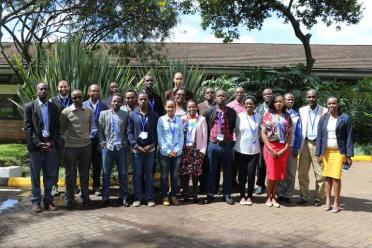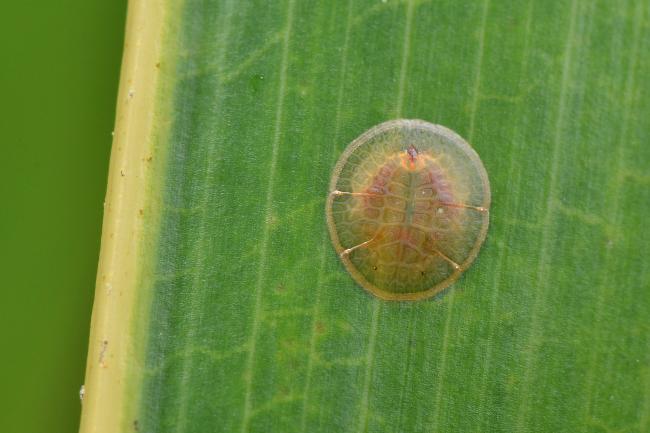
The first phase (Build) consists of seven formal training modules in various areas of bioinformatics including programming in the Unix environment, analysing NGS data, whole genome assembly, diversity studies, biostatistics and phylogenetics, and implementing bioinformatics pipelines over various hardware infrastructures. Each formal training module (one to two weeks each) will be followed by an exercise period of a similar length to ensure that the knowledge and skills acquired in the formal training modules are immediately used by the fellows.
The second phase (Empower) will consist of a train-the-trainer programme and a final project, whereby the fellows will be taught skills to pass on their knowledge to other students and scientists, and will showcase their newly acquired bioinformatics skills on real-life analysis problems.
The third phase (Amplify) will entail a short training on soft skills (project proposal writing, scientific communication, etc) as well as two regional training workshops in which the Bioinformatics fellows will be the trainers for other African colleagues.
The technical, transferrable and pedagogical skills impacted during these three complementary phases are not common place in many bioinformatic training programmes. Furthermore, it is hoped that hosting the carefully selected participants together for eight consecutive months will foster interaction that will build a self-sustaining “community” providing bioinformatics support beyond the training programme.
This initiative is modelled after the successful flagship training programme at the BecA-ILRI hub - Africa Bioscience Challenge Fund (ABCF), which is supported by the Bill & Melinda Gates Foundation and the UK Department for International Development. It is co-funded through a grant from UK’s Biotechnology and Biological Sciences Research Council (BBSRC) as part of the UK Global Challenges Research Fund (GCRF-STARS). The three co-PIs for this programme are Dr Cristobal Uauy (John Innes Centre, UK), Dr Jean-Baka Domelevo Entfellner (BecA-ILRI Hub, Kenya) and Dr Robert Davey (Earlham Institute, UK) and is being managed by Dr Oluwaseyi Shorinola (John Innes Centre, UK).
Dr Jacob Mignouna, Director of the BecA-ILRI hub as a new sustainable model: “The BixCoP capacity building model, which is designed with sustainability and long-term impact in mind, is a new model that will help guide BecA-ILRI Hub ABCF program moving forward. I’m very excited with this new model of engagement of scientists in the region to jointly address the need of generating and utilizing bioinformatics tools to transform agriculture in Africa”.
Dr Cristobal Uauy (JIC), the project lead for the GCRF-STARS grant said: “We are extremely excited to launch this initiative to address the shortage of bioinformatic skills in the region. This builds upon our long-term partnership with the BecA-ILRI hub and looks to deliver training from a completely novel perspective.”
Dr Davey, co-PI from Earlham Institute said, "This programme is a testament to the quality of the Carpentries materials, the organisation of the partners, and the commitment from BBSRC and BecA-ILRI Hub to train the next generation of bioinformaticians in Africa. It's hugely exciting to be able to support the fellows, and see how their new skills can be used to empower themselves and their communities."
Dr Jean-Baka Domelevo Entfellner, head of bioinformatics at the BecA-ILRI hub explained the motivation for the training: "Agriculture in Africa needs modern biosciences to improve and overcome the challenges it is currently facing. Bioinformatics represents a major opportunity for an under-resourced continent to leap to the forefront of world-class science to address these challenges. For this to happen, we need a strong commitment to human capacity building in bioinformatics in the continent. With this BiXCoP programme, we are making a bold and decisive step towards the creation of an effective and sustainable network of bioinformatics scientists for agricultural biosciences in Africa".
The cohort of fellows for this 2018 Bioinformatics Community of Practice is made of 14 early-to-mid-career African researchers carefully selected from nine different countries (Democratic Republic of Congo, Ethiopia, Kenya, Nigeria, Rwanda, Sudan, Uganda, Tanzania, Zimbabwe).
The programme was officially launched with an opening event held on the 3rd - 4th of April at the International Livestock Research Institute (ILRI) campus, Nairobi, Kenya. During this event, the 14 BiX CoP fellows met together for the first time, shared their expectations for the programme and discussed how to maximise their learning during the training and to amplify the impact of the training upon their return to their home institution.
Remarks by Dr Wellington Ekaya- ILRI Head of Capacity Development: The BiXCoP training is a well-thought-out model that builds on past successes in capacity development at the BecA-ILRI Hub through the ABCF Programme. The programme has been shaped through engagement and partnership with individuals and institutions in Africa, Europe, USA and beyond. The BFX Cop aims at addressing a pressing capacity gap in Africa, which if addressed, will unlock Africa’s potential for harnessing advances in biotechnology to accelerate agricultural research and innovation. Its immediate potential lies in effectively supporting the existing 14 ABCF alumni-led Communities of Practice.


